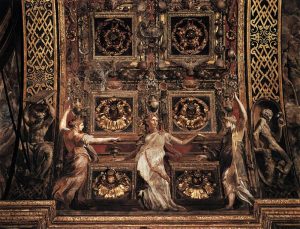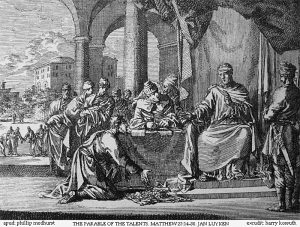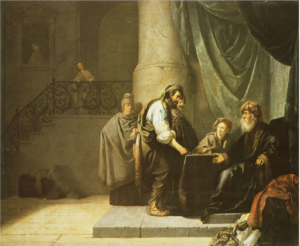Thoughts on Sunday’s Lessons for Nov. 12, 2023 (Pentecost 24A)

Three Foolish Virgins Flanked by Adam and Eve (1531-1539), fresco by Francesco “Parmigianino” Mazzola (1503-1540). Sanctuary of Santa Maria della Steccata, Parma, Italy. (Click image to enlarge.)
First Reading (Track One): Joshua 24:1-3a,14-25
Sunday’s Lectionary readings are challenging. They make us work to discern how – or even if – these selections from Scripture might guide our lives. In the Track One first reading we find the people renewing their covenant with God as they enter the promised land. Joshua calls on all the tribes of Israel to swear allegiance to God, the Lord of Israel. Declaring the God of Israel “a jealous God,” Joshua emphasizes the people’s theological separateness from the gods of their new neighbors, and calls them to a new covenant, reinforcing the covenant that they had made with God through Moses at Sinai.
First Reading (Track Two): Wisdom of Solomon 6:12-16
The Wisdom of Solomon, a short book in the Apocrypha, was written in King Solomon’s name not long before the time of Jesus and the evangelists. It reminds us of a memorable passage in Proverbs that personifies Wisdom as a female voice, a strong woman who sits at the city gates and advises the people on right living, and even presents Wisdom as the female presence who was with God at the moment of creation. This short reading tells us how easy it is to find Wisdom, for she meets us more than halfway and graciously finds us in our paths and thoughts, if we are worthy of her.
Alternate First Reading (Track Two): Amos 5:18-24
The prophet Amos challenges us with a frightening question in this alternative reading: What if we confidently await the day of God’s judgement, assuming that we have lived well, but learn to our shock that God has rejected our prayers and turned away? Amos warns that God doesn’t care about our burnt offerings but only about how we live! But the prophet offers hope, warning the people to follow God’s way or risk destruction and exile: If only we seek good, not evil, when we let our righteousness flow like mighty waters, then God will be with us.
Psalm (Track One): Psalm 78:1-7
We sing only the first seven verses of a long, 72-verse Psalm today. If we had the time to chant it in full, we would hear an extensive account of the people’s sins and failures, a dark narrative indeed, but one that turns at the end to a happy conclusion under the love and guidance of God. This provides a little context to the Psalm’s confident beginning, which sings of the good news of God’s gifts to humankind, God’s words and teachings that we should pass down to our children and their children’s children.
Psalm (Track Two): Wisdom of Solomon 6:17-20
The verses just preceding these lines from The Wisdom of Solomon appear as an alternative first reading for Lectionary Track One today. This short book in the Apocrypha celebrates Wisdom as a female voice, a strong woman who sits at the city gates and generously gives advice on right living. This snippet nails down the importance of loving wisdom and following her laws, for this is the assurance of wisdom that brings us near to God and leads us to God’s kingdom.
Alternate Psalm (Track Two): Psalm 70
This Psalm, like the alternative first reading from Joshua, opens on a dark note: The Psalmist begs God to deliver and save him from enemies who enjoy his misfortune and gloat over his losses. The Psalmist wants a kind of justice that is very far from turning the other cheek: He wants to see those enemies suffer the shame and disgrace that they wish for him! He knows that the poor and needy can count on God’s protection, but he can’t wait. Come to us speedily, God, the Psalmist sings. Oh, Lord, do not tarry!
Second Reading: 1 Thessalonians 4:13-18
Paul’s imaginative description of the coming of Christ, complete with an archangel’s shout and trumpet blast, the dead rising from their graves and the people of God rising into the air, has become the basis for a lot of colorful theories about what the return of Christ might look like. Some Christians read this passage as a literal prediction of the last days. But most bible scholars offer a simpler explanation: At the time of this letter – the earliest in the New Testament – many Christians still thought that Jesus would return and establish God’s kingdom while they were still alive to see it. But now some members of the church were dying! Would they miss out? No, writes Paul. Know this and encourage each other: All will be saved.
Gospel: Matthew 25:1-13
When Matthew tells us that Jesus said, “The kingdom of heaven will be like this,” we can expect the following parable to challenge our expectations. Sure enough, this story is just as unsettling as the other kingdom parables that the Lectionary has offered recently: the outcast who had no wedding garment; the murderous vineyard workers; and the workers who were all paid the same. Here, the bridesmaids who didn’t plan ahead were locked out of the banquet, dismissed by the bridegroom, even though he was late himself! Is Jesus telling us that the kingdom of heaven is unfair? No. Rather, the parable offers simple wisdom to early Christians who expected Christ to come back soon: Jesus, the bridegroom, is coming: Be ready!


